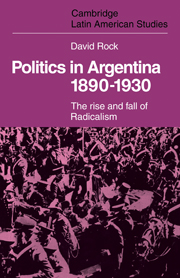Book contents
- Frontmatter
- Contents
- Preface
- 1 The components of Argentine society, 1890–1914
- 2 The oligarchy and institutional reform, 1880–1916
- 3 The rise of Radicalism, 1891–1916
- 4 The workers and their politics in Buenos Aires, 1890–1916
- 5 The first Radical government, 1916–22
- 6 The strikes, 1916–18
- 7 The Semana Trágica
- 8 1919
- 9 Postscript to the first presidency, 1920–2
- 10 The Alvear interlude, 1922–8
- 11 Yrigoyen's second presidency, 1928–30
- 12 Perspectives
- APPENDIXES
- 1 The occupational and class structure of the male population of the city of Buenos Aires by nationality, 1914
- 2 The rise of Radicalism – an historiographical note
- 3 The first Radical government and the Argentine Rural Society
- 4 The working class vote for the Radical and yrigoyenista parties in selected areas of Buenos Aires, 1912–30
- Select bibliography
- Index
- Frontmatter
- Contents
- Preface
- 1 The components of Argentine society, 1890–1914
- 2 The oligarchy and institutional reform, 1880–1916
- 3 The rise of Radicalism, 1891–1916
- 4 The workers and their politics in Buenos Aires, 1890–1916
- 5 The first Radical government, 1916–22
- 6 The strikes, 1916–18
- 7 The Semana Trágica
- 8 1919
- 9 Postscript to the first presidency, 1920–2
- 10 The Alvear interlude, 1922–8
- 11 Yrigoyen's second presidency, 1928–30
- 12 Perspectives
- APPENDIXES
- 1 The occupational and class structure of the male population of the city of Buenos Aires by nationality, 1914
- 2 The rise of Radicalism – an historiographical note
- 3 The first Radical government and the Argentine Rural Society
- 4 The working class vote for the Radical and yrigoyenista parties in selected areas of Buenos Aires, 1912–30
- Select bibliography
- Index
Summary
The revolution of 1930 revealed that if Argentina's politics had acquired certain hybrid qualities during the previous forty years, the supremacy of the landed and commercial elite of the pampas had not diminished in any substantial way. The coup swept away the impression that because of the introduction of representative government and the rise of yrigoyenismo, power had passed from the elite into new hands. It restored a close and identifiable relationship between economic power and formal control over the State.
Yet this is only partly the story, and it fails to reflect the central transition which had occurred during the previous forty years. In 1890 there was only one relevant political constituency, the elite itself. During the political struggles of that year segments of the elite in the Unión Cívica may be glimpsed fruitlessly attempting to prod the urban middle classes into political activism in their support. But when the crisis of the 1890s passed, stability was restored by a number of factional covenants exclusively within the elite. In 1919 by contrast, and particularly in 1930, the situation had radically changed. The elite was compelled to weigh the position of the urban middle class very carefully, and seek its support before being able to act against Yrigoyen. Had, for example, Generals Justo and Uriburu attempted to prevent Yrigoyen's reelection in 1928, they could well have been faced with a popular counter-revolution.
- Type
- Chapter
- Information
- Politics in Argentina, 1890–1930The Rise and Fall of Radicalism, pp. 265 - 274Publisher: Cambridge University PressPrint publication year: 1975



